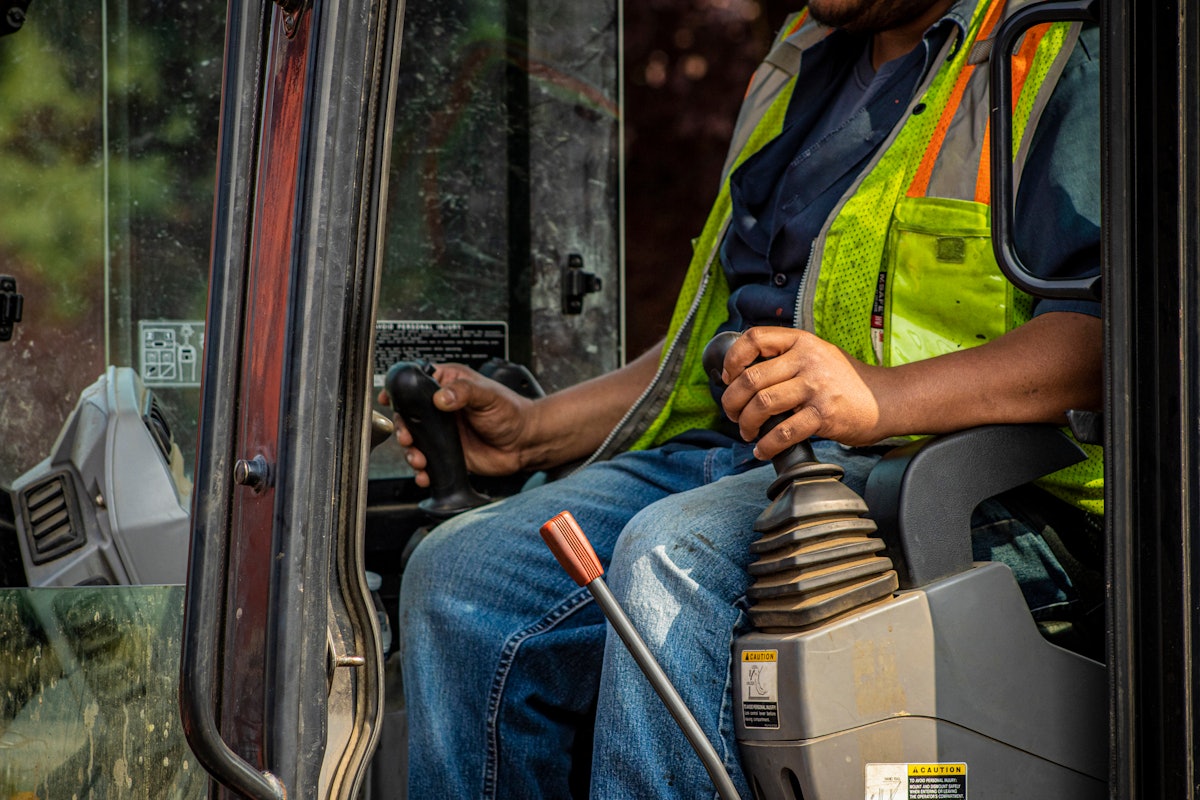Heavy Equipment Operator Pay & Benefits: 2024 Report
Pay is skyrocketing but it's still not enough to fill positions in the chronically understaffed profession, according Equipment...

Heavy equipment operator pay is skyrocketing but it’s still not enough to attract an adequate number of workers to the chronically understaffed profession, according to the results of Equipment World’s second-annual Heavy Equipment Operator Pay & Benefits Report.
With smaller pools of qualified workers to pull from, shorthanded contractors are being locked out of new projects and growth opportunities, all while project owners and taxpayers suffer from higher costs and longer timelines for infrastructure and other projects across the country as a result.
Associated Builders and Contractors estimates contractors will need to hire 501,000 additional workers on top of the normal pace of hiring to meet labor demands this year.
“Broadly, there are two factors shaping the interaction between construction worker supply and demand,” says ABC Chief Economist Anirban Basu. “There are structural factors, including outsized retirement levels, megaprojects in several private and public construction segments, and cultural factors that encourage too few young people to enter the skilled construction trades.”
With few qualified operators to put in cabs, those who are working can command high wages – and it’s likely the largest factor driving up total compensation, according to Equipment World survey commenters.
“There is a stigma for younger people to enter the trades, therefore, there is a shortage. This drives up the cost and pay rates for the few experienced operators,” said one operator.
And those experienced operators are staying put, asserts another. “The quality operators are being paid to stay at their current location. The bad or inexperienced are the ones let go and looking for work.”
Managers of operators agree. “The industry is busy here in Honolulu, Hawaii, so all good operators are working.” Yet another said, “We struggle finding operators because there is a limited number of qualified operators looking for work.”
Paid and happy
An overwhelming 77% of operator respondents said they make $70,000 or more per year. That’s up from the 53% of operators in that range from our survey just a year ago. Among those high-earning respondents, 36% – the highest response rate of any category – listed their annual pay, before taxes, including overtime, bonuses and incentives, as $100,000 or more, a 15% jump from 2023.
According to the latest Current Employment Statistics report from the BLS, non-seasonally adjusted average hourly earnings in construction increased 5% since a year ago and approached the $38 mark in March 2024.
The bulk of respondents surveyed, 81%, are paid hourly, while 22% of operators are paid a flat rate. Above and beyond base pay, 11% are offered bonuses; another 11% are offered profit-sharing opportunities, and 6% participate in an incentive program.
To achieve those earnings, a majority of respondents, 35%, told Equipment World they work 41 to 50 hours per week. Another 32% said they work 51 to 60 hours per week. And a much smaller percentage, only 11%, said they work 61 to 80 hours per week. No respondents said they work more than 80 hours per week.
It should be noted that regional weather conditions could impact the number of hours per week respondents are on site, with those in colder climates working more during warmer months and taking part in layoffs over the winter, which was not factored as part of this survey.
The upshot here seems to be that most operators are achieving a satisfactory level of base pay without having to work excessive overtime.
While a majority of respondents were drawn to the career path because of the technical aspects of the job (44%) or having family in the business (38%), 35% said they initially went into heavy equipment operation because of the “good salary or a way to provide for my family.” Most also cited pay and benefits as the No. 1 factor when choosing a new job, followed by location and scope of work.
Those currently working as operators are content and see a future for themselves in the profession, with 60% saying they are happy working for another person as long as they are paid well and treated fairly. Another 17% would like to branch out and start their own company, and 15% aspire to move into a non-operating role in the field or office. A mere 7% would like to get out of construction, and 1% said they don’t think of being an operator as a long-term career, just a job.
One operator said, “I enjoy the challenge and take pride in my work.”
“I’m still playing in the sandbox with my buddies,” commented another.
Adding benefits to the equation
Closely tied with salary concerns are the benefits that come with the total compensation package for heavy equipment operators.
It’s an important factor for employees and employers alike, considering individuals between 45 and 54 years of age are the second most likely group to be injured on the job, with the vast majority of incidents being equipment accidents or slips and falls, according to the Bureau of Labor Statistics.
In general, our respondents were content with their employee benefits, with 36% saying they are extremely satisfied, another 36% somewhat satisfied and 18% neither satisfied nor satisfied.
Most operators also felt they were offered a fair amount of sick leave, with only one-quarter of respondents calling their employer’s policy “not so fair” to “not fair at all.”
One area employer benefits may be falling short is retirement. Only 54% of respondents said they are offered a retirement fund, and less than half (43%) said they were saving enough money to retire at their desired age.
When asked when they would like to retire, 19% of operators said before age 65; 11% said at age 65; 11% said at age 67; 6% said at age 70, and 19% haven’t decided yet. The largest percentage of respondents — 33% — said they would work as long as they were healthy.
Of those investing in retirement accounts, 19% said they invest in a 401(k) or Roth 401(k), 14% have a basic savings account or other investments, 13% use a traditional IRA, 7% use a Roth IRA, 6% have a Simplified Employee Pension, and 18% use more than one of the above. However, 24% of respondents said they have no retirement accounts.
Tom Santa Barbara of Direct Advisors LLC, a benefits consulting firm, advises employers to continually assess their workforce and regularly examine their full benefits package. “[Employers should be] asking themselves if they are setting their employees up for long-term success well beyond their years on the job which, in turn, helps create loyalty and reduces some of the staffing capacity pressure,” he says.
Correcting course
Despite the high income potential and general sense of fulfillment heavy equipment operators get from their jobs, construction business owners still struggle to meet field labor demands as droves of older workers hang up their hard hats and fewer new workers come on board to replace them.
Mirroring industry concerns about the aging workforce, 70% of operator respondents identified as 50 or older, and 75% say they have been operating for more than 20 years. This figure, however, trends older than the latest Bureau of Labor Statistics data, which says the median age of construction and extraction occupations workers is 41.2, and nearly half of construction workers are 45 or older.
Either way, it’s an alarming statistic considering the average retirement age of a construction worker is 61. At this rate, the industry is set to lose a large set of its institutional knowledge within the next decade.
When Equipment World asked participants why construction companies are having a hard time finding operators, the overwhelming majority said for the second year in a row that “the younger generation doesn’t want to work.”
But not all the commenters placed the blame squarely on “kids these days.” A wide variety of responses cited everything from poor industry perception to a lack of training to unrealistic travel expectations – and even too-strict drug testing amid changing marijuana regulations – as additional reasons for the shortage.
“The younger generation does want to work but they want a job in a more controlled environment, like an office,” said one respondent. “Younger operators want air-conditioned cabs and predictable work hours.”
“It’s not perceived in a positive light by society. It doesn't seem like a legitimate career path for young people,” added another. “And some in the younger generation haven't had the satisfaction of a job well done, and how that translates to a fulfilling life.”
A lack of training
Many believe there hasn’t been enough emphasis placed on developing training programs for operators.
Nealy half of all operator respondents (46%) said they have not participated in technical training for their role, and another 26% are not offered training opportunities from their employer.
“There’s a lack of hands-on training for people that are interested, as well as the cost to be trained,” said one operator.
“Companies don’t want to teach the younger generation,” added another.
Several others think the investment needs to start with school-based training programs.
“There is a lack of experience in operators. There needs to be a bona fide operator certification program for heavy equipment,” one manager said.
“Our schools need to invest in training young people for careers other than college,” added another.
The issues of low-skill candidates and the lack of quality training programs also surfaced in the latest workforce survey from Associated General Contractors. “The biggest takeaway…is how much the nation is failing to prepare future workers for high-paying careers in fields like construction,” said AGC Chief Economist Ken Simonson. “It is time to rethink the way the nation educates and prepares workers.”
[Related Content: Opinion: Did 'South Park' Nail the Reality of the Skilled-Worker Shortage?]
The technology factor
With it unlikely that training programs will be able to fill the talent void that took decades to create, the next best solution for contractors may be heavy investment in technology.
New technologies integrated directly into construction equipment can provide insights for initiating training conversations, operator coaching based on performance, and automated weighing and digging systems, enabling green operators to work efficiently right away.
Most business owners find that younger employees, who have grown up with smartphones or video game controllers in their hands, take quickly to technology – and can even serve as digital mentors for older employees.
For those not ready to stick a 20-year-old in a $600,000 excavator, simulator training can also be a cost-effective way to upskill new operators without affecting production, burning fuel or risking employee safety.
In an economy where owners can’t keep raising rates and passing along costs to customers, technology is letting contractors do more with fewer, less experienced people.
Recruiting and retention advice – from operators, for operators
We closed out our survey by asking operators what they would do to attract and retain more talent. The top three responses were: raise pay, offer performance bonuses for on-time project completion, safety or other factors, or update to new equipment and trucks to make operators more comfortable and efficient.
Respondents also offered the following advice for the next generation:
- “Take the time to learn the art of the profession.”
- “You are always being watched and evaluated. Treat every hour of every day like a job interview.”
- “Be safe and respect the equipment. Be the best you can be with every piece of equipment you operate.”
- “Pay attention to good operators and watch how they work. See what they do to be more efficient.”

 machineryasia
machineryasia 









